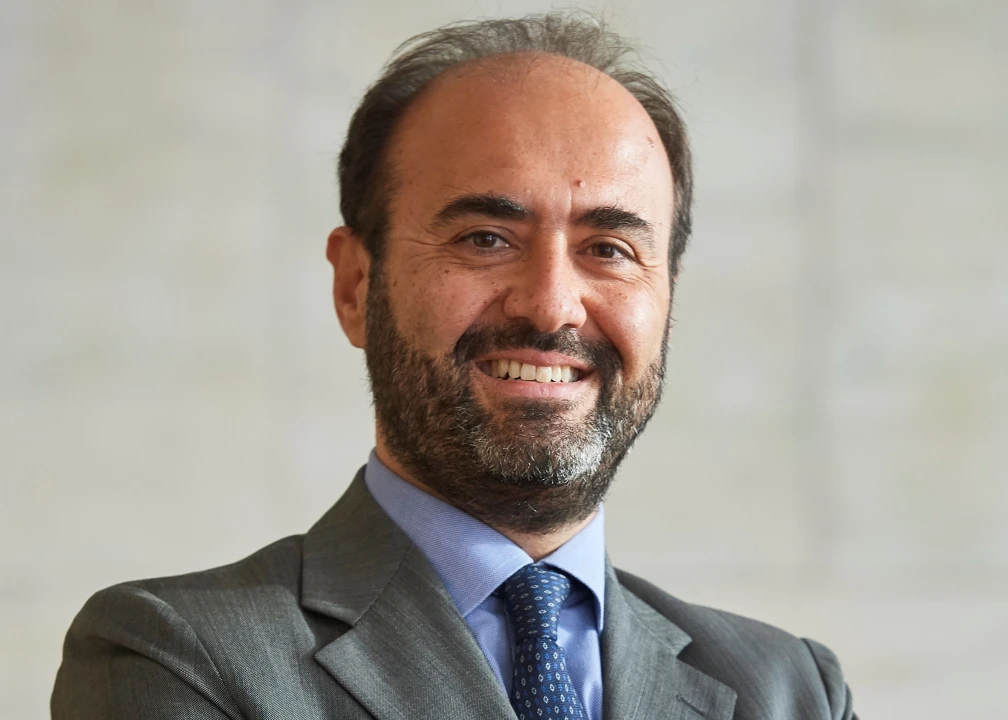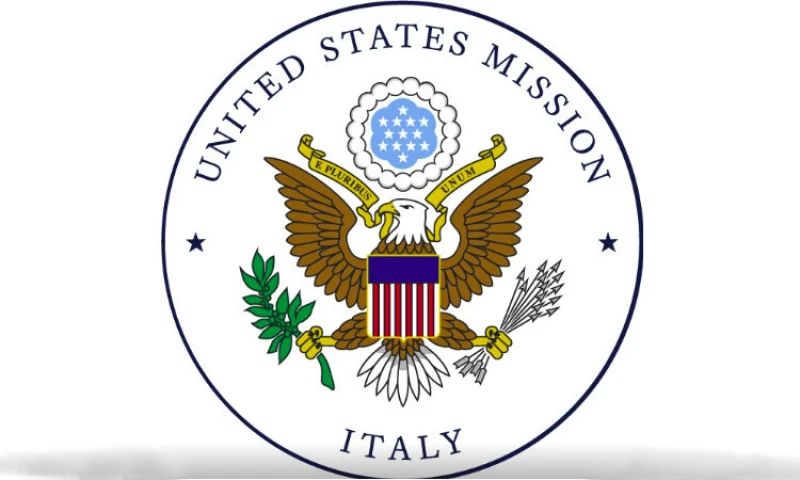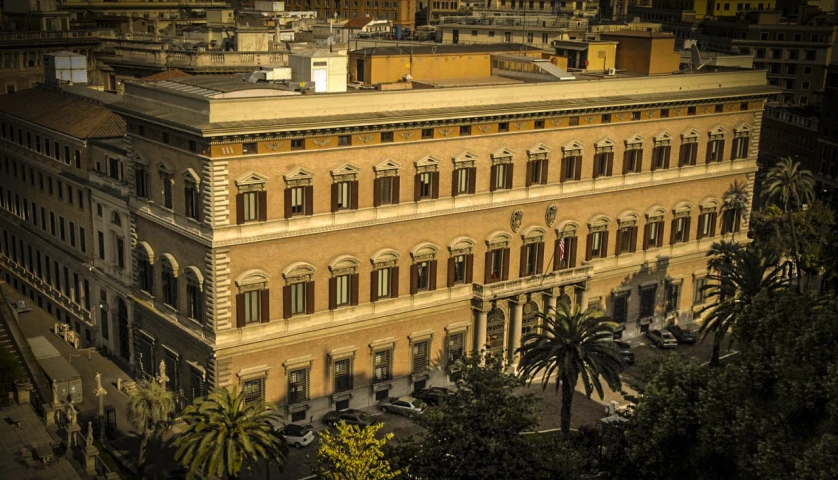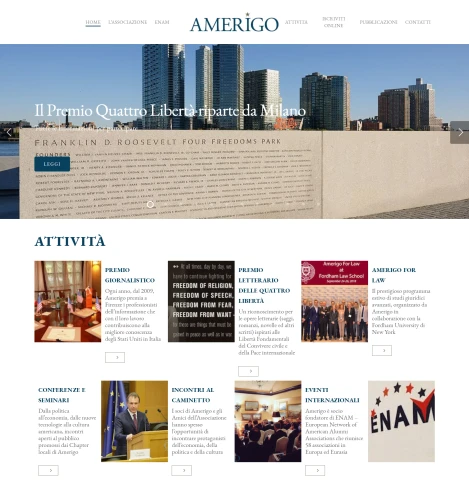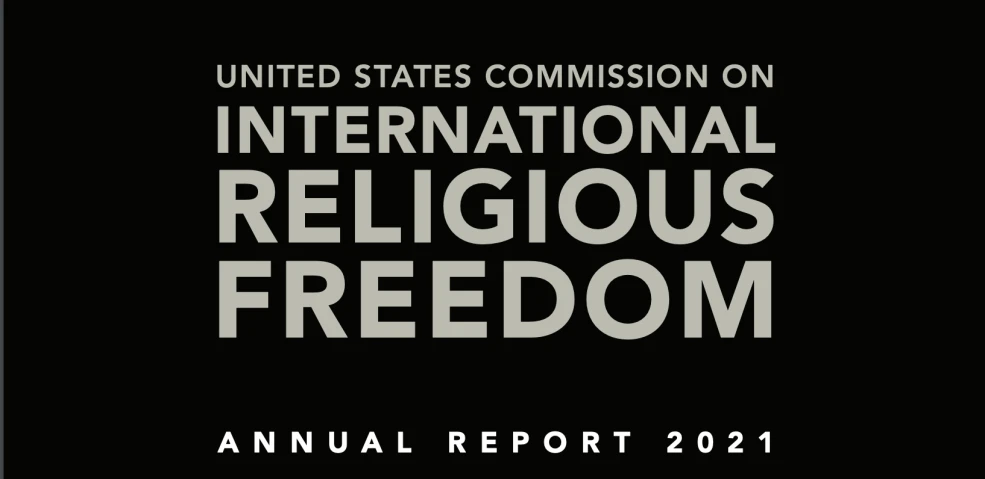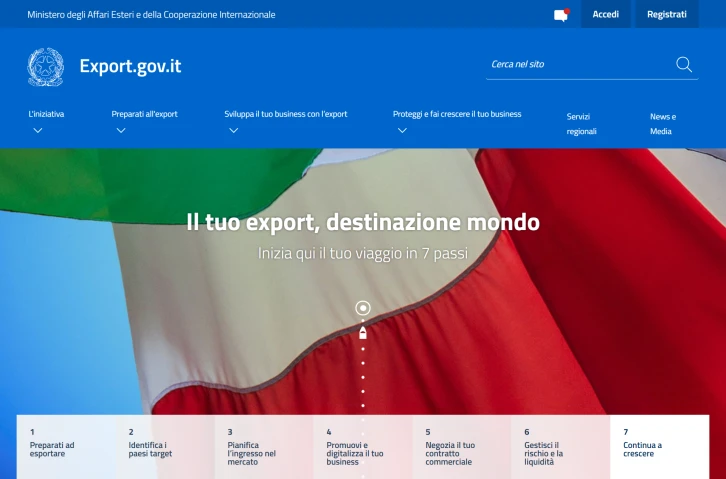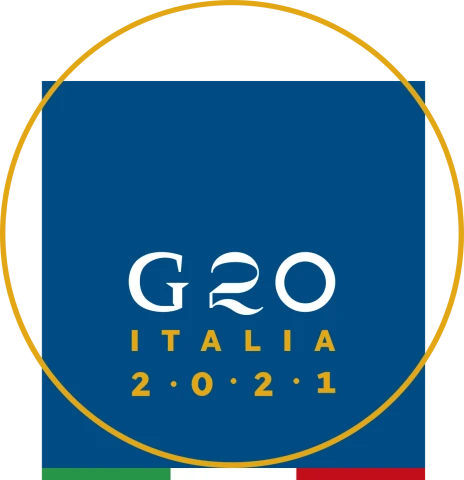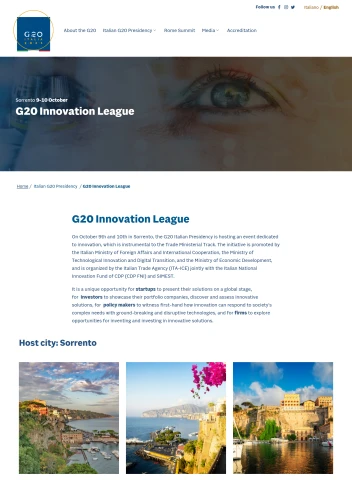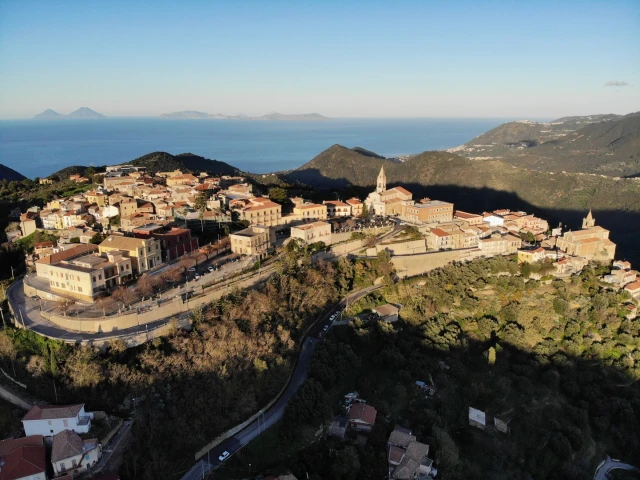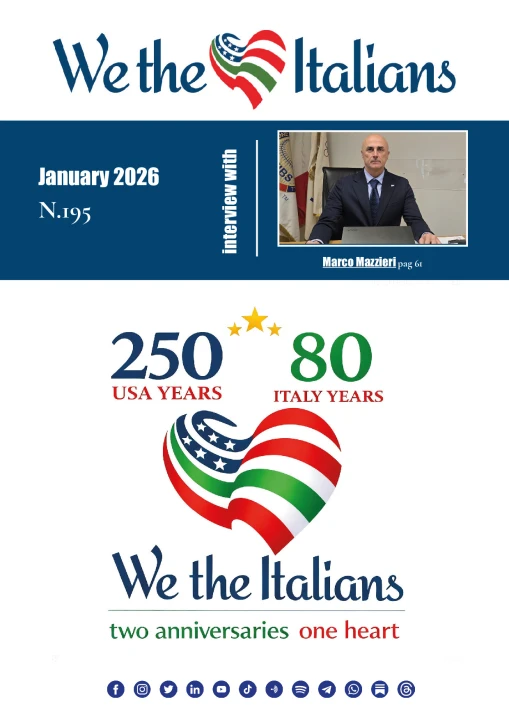The list of Italians who hold here in Italy institutional positions of collaboration with the United States is not very long. We have interviewed almost all of them over the years, and today we host one of them, who is also a close personal friend of mine.
Andrea Gumina is the President of Amerigo - Intercultural Exchange Program Alumni Association. Sicilian, an economist, he currently serves as Advisor to the Minister of Foreign Affairs for export and internationalization policies, and is Senior Policy Advisor to the Italian Government's G20 Sherpa Office. With a Ph.D. in History and Theory of Economic Development and a Master in Social Doctrine of the Catholic Church, he spent the first years of his career in academia, later giving birth to several start-ups in the field of innovation.
Dear Andrea, we have known each other more or less for twenty years, since when, as a young entrepreneur, you organized "Start-Up Meetings" with the American Embassy in Italy. I would like to start by recalling this experience, because I believe it marked an important stage in your journey with the USA
Dear Umberto, first of all let me say that it is a great honor for me to give this interview to "We The Italians", especially because our chat takes place at the same time as a series of important junctions for me, both personally and professionally. More or less like twenty years ago.
At that time in Italy, the world of start-ups was still a bit esoteric. The wonders of the "dot economy" and First Tuesday echoed in our country. In the early 2000s, while I was pursuing a PhD in History and Theory of Economic Development, I became interested in the themes of entrepreneurship, investment and technology transfer. We set up a university spin-off with some colleagues to design, among the first in Italy, ecosystems of digital services.
I remember being fascinated by two principles on which the American system is based: give-back and match-making. In those years I was a member of the Young Entrepreneurs of Confindustria, and it seemed like a good idea to try to imitate a successful initiative, the one that brought together idea holders with business angels. We organized, together with the Rome University Luiss Alumni and the Lazio Region, four meetings, streamed via satellite (at that time a live streaming on the internet was unthinkable).
The American Embassy noticed us, and there began my liaison with the United States. In fact, with today's eyes, I can only admire the foresight of the diplomatic staff and officials of the American mission in Italy. That was the beginning of a crescendo that led our "team" to work together with the American Ambassador pro tempore, Ronald Spogli, on the seeds of what would become the Italian venture capital ecosystem. It was the American Embassy that brought together several groups from different parts of Italy, first scheduling a series of meetings in Italy and then giving several of us the opportunity to have an exchange experience in the United States, to understand from the most important investors how to replicate their success stories in Italy. I met the main players in Silicon Valley and the East Coast, and then the Kauffman Foundation. I can say that that trip radically enriched both my vision of "doing business based on knowledge" and my relationships. I treasured it and still do.
A few years later, I found myself moving from the world of hi-tech business to the world of institutions, and it was in this capacity that I tried to make my contribution as a policy maker to recreating the conditions for growing innovative businesses in Italy. I remember that on Christmas Day 2014 we approved a 50 million euro measure as a government, to give birth to the first venture capital investment fund promoted by the Ministry of Economic Development. Five years later, the billions dedicated to the purpose became 2. Not to mention the dozens of funds we have helped to create. These numbers are very small compared to the USA, but in Italy we started 30 years late, and perhaps it would never have been possible without the encouragement of our American friends. Not to mention the fact that, thanks to this experience, I became part of the IVLP family, the lucky ones who attend the International Visitors Leadership Program.
Let's talk about Amerigo, the association of which you have been president for about a year. I know that you have started many important projects in a transatlantic perspective. Would you please explain to our readers who it is composed of, what are its objectives and what do you do?
Gladly. Amerigo is the "home" of the Italian Alumni of the cultural exchange programs promoted by the U.S. Department of State. Since the Second World War, the United States realized the strategic importance of cultural diplomacy, implementing what would prove to be the largest effort to bring American values closer together in history, targeting both promising and already established leaders in various countries. Through a series of instruments - scholarships, in-depth and exchange programs - more than 16,000 Italians have been involved in different capacities among the Department's various programs: IVLP, Fulbright, Eisenhower just to name a few.
In some cases, the initiative, the objective and the outline of the program is elaborated by the State Department; in other cases, it is the proposer, or the group of proposers, who submit ideas through the domestic diplomatic-consular office. That’s what happened in my case. Around 2007, then, the Department of State supported the creation of a series of associations that, in the various countries involved in the programs, would bring together those who had been involved in these exchange programs. Italy led the way, giving birth to Amerigo, the Association of which I am honored to be President, and then promoting the birth of various umbrella networks, such as ENAM (the European Network of American Alumni Association) and the very recent Transtatlantic Alumni Network, in which Italians have always expressed significant leadership.
Amerigo today brings together the Alumni of the various exchange programs in Italy, but also the "Friends of Amerigo", people who have not yet had the privilege of living this experience but who share with us the importance of transatlantic dialogue and collaboration. Our activities, in presence and on-line, are organized around six territorial chapters: Rome, Milan, Naples and Florence - in Italy - and more recently Brussels and New York. We aim soon to become active also in San Francisco, London, Tel Aviv and Dubai, in order to represent more and more a transversal platform able to favor the exchange of relationships, competences and visions at a personal, entrepreneurial and institutional level, between our two great countries.
Our goal is twofold: on the one hand, to promote and maintain the network, in close collaboration with the US diplomatic mission in Italy. On the other hand, through events and initiatives open to our members, but also to Alumni and those who have an interest in transatlantic relations, we want to foster the development of joint initiatives between Italy and the USA, or even just a better understanding of certain dynamics that affect the interaction between the two sides of the Ocean. For those who are interested, in the latest issue of our Amerigo Magazine you can also find all our programs.
Let's stick to the "give back" theme. It seems to me that many of Amerigo's actions are inspired by the idea of sharing with the communities in which you operate the knowledge and relationships matured during transatlantic exchanges. Is this true? What impact does this have concretely in Italy?
In fact, this has represented, in an increasing way, the signature of our activity during the last years. I can say that Amerigo has established itself on the Italian scene, not only as a platform for interaction between Alumni, but also as an important partner for institutions, study centers, companies, in understanding and translating the most recent evolutionary dynamics in relations between Italy and the United States. In the course of time, on the contrary, we have tried more and more to side our networking vocation with that of content.
This has led to the creation of formats that have flanked the classic meetings, becoming over time a consolidated tradition of our Association. The Amerigo Journalistic Award, for example, has been awarding every year for 12 years the reporters who have distinguished themselves for helping the public to better understand the dynamics between our two countries. For four years, then, the Literary Award of the "Four Freedoms" is a further moment of reflection on the essays and novels that best interpret the words of Franklin D. Roosevelt, who in his famous speech on January 6, 1941, linked peaceful international coexistence to freedom of speech, freedom of religion and freedom from want and fear. We have just held the 2021 edition in Milan on July 5, our first "in presence" event in many months.
Alongside these initiatives, Amerigo has promoted in recent years special projects, with ad hoc teams, often composed of our Alumni and valuable interlocutors in institutional seats, which serve to launch and promote special initiatives. In the past, for example, we have contributed with the "Smart City Tour" to launch an important governmental program of innovation in the most important Italian cities, starting from the comparison with the most significant American experiences, starting from Chicago.
I think this is a very interesting track because it allows our Alumni to fully value their contribution to the country. Having the privilege of having such an experience, which multiplies your understanding of the workings of a superpower like the United States and also broadens your relational relationships, makes sense if you share this value with your community - local and national. I have to say that most Alumni, thanks in part to their roles of increasing responsibility within institutions and major corporations, are always more than happy to collaborate on this design. This allows us to set ourselves increasingly challenging "civic engagement" goals.
Tell us about your next challenges as President of Amerigo
After twelve months of necessarily virtual activities, my second year in office aims to complement the initiatives of the Amerigo tradition with other multi-year paths, all with a high potential impact on the country and on the relations between Italy and the United States. In particular, I am working together with my entire Executive Board to implement three work programs, different from each other, but characterized by a common denominator: strengthening the understanding of the relations between our countries and involving the Italian and American communities in initiatives with a high social impact.
The first strand concerns Interfaith Dialogue: on September 2 at 1 pm, via webinar, thanks to the coordination of our colleague Imam Yahya Pallavicini, Amerigo will present the Report on International Religious Freedom of the U.S. State Department. For the first time we will have to comment on it, in addition to the author, Dan Nadel, three eminent representatives of monotheistic religions at the international level (Rabbi David Rosen, Prof. Cole Durham and Prof. Yahya Cholil Staquf). With this "premiere", which will anticipate by a few days the G20 Interfaith Forum, Amerigo intends to start a cycle of annual comparison on a theme, that of religious freedom, which strongly influences strategic relations at international level. It will be a careful commentary, I believe, and not without constructive criticism.
The second program relates to cities and talent. In July 2019, Amerigo and a series of partners launched, under the sponsorship of the U.S. Diplomatic Mission in Italy, a "Partnership for Growth" dedicated to the enhancement of cities, which drew on the theses of Prof. Steven Wolff, promoter of the renaissance of Pittsburgh and its Cultural District. During 2020, Amerigo catalyzed the interest of a first group of operators around the constitution of a Benefit Corporation - City of Talents - which has spent the last 10 months studying, together with the main institutions in Italy, which housing model would be more appropriate to attract and retain talents in our major cities and, in perspective, in smaller villages. The result is a project, "Home of Talents", which aims to acquire, transform and make available large portions of unused public and private assets, in the most attractive and iconic places of the peninsula, in parallel with a major program of public investment in start-up and scale-up that the Italian Government has developed and is implementing in recent months. The target cities are Rome, Naples, Palermo, Catania, Bari, Florence, Bologna, Trieste, Genoa and Turin. We will soon expand the share capital of this "spin-off" of Amerigo, destined to become a sort of public company: this is an example of how the participation of a community of professionals in Italy can draw inspiration from transatlantic good practices in developing a concrete, feasible and scalable project, able to generate interest also in investors.
The third major project, of which I am particularly proud, is dedicated to trade and investment relations and will start at the end of October, thanks to the partnership between Amerigo, Centro Studi Americani, Federmanager and AISES (International Academy for Economic and Social Development). The Transatlantic Investment Committee (TIC), which will be officially presented between October 27 and 28 in Rome, intends to bring together the best minds from both sides of the Atlantic, to take stock every year of the dynamics between our countries and propose concrete opportunities for policy improvement and strengthening of the dialogue between our economic systems. This initiative is inspired by two considerations. On the one hand, the pandemic has only accelerated an ongoing process, in which multilateral relations must become more mature and based on realism, understanding and concreteness. On the other hand, the profound transformations - social, technological, economic - that will characterize the current decade, can only strengthen the need for investments and convergent strategies between areas of the world inspired by a common set of values. In this sense, the TIC will want to be a spur, in the coming years, to mature and share good practices, relationships and strategies between Italy and the United States, in the field of policies, investments and internationalization. In Italy, in particular, I believe that it is important to further enhance the cooperation between Italian and US investors in sectors with high growth potential (from agrifood to energy and cars, passing through the tourist-retail sector, luxury and technologies for advanced manufacturing), where having a common vision also means minimizing the risk that certain assets escape strategic control.
I hope that the first fruits of this work can be seen in the first semester of 2022, perhaps on the occasion of the first major reunion of Italian Alumni that we would like to hold between May and June of next year, when we hope that health conditions will allow it, and which will also represent the final moment of my mandate.
At this point, let me refer to your professional activity. Your passion for international relations does not seem to stop with Amerigo. Today, you also serve as Advisor to the Minister of Foreign Affairs on internationalization, and you follow the Italian presidency of the G20. Are there aspects of your work that have benefited from your continuous exchange with the United States?
Not directly, I would say, but certainly having had a profitable relationship with an attentive and demanding diplomatic counterpart like the United States early on - well before I dedicated most of my time to Italian institutions - has helped a great deal in understanding various negotiation and partnership mechanisms.
I would like to make a very strong distinction between my commitment as President of Amerigo and my professional activity. I really live my work as a moment of "service", trying to provide the final decision-maker - the politics - with the most adequate information to decide, more than "ready-to-use" solutions. It is not my task, in this capacity, to make decisions: my responsibility is rather to give an "intelligent key" to a plurality of information coming from very well prepared sources and colleagues - the Italian diplomatic service is indeed an institution of excellence - giving it an innovative slant, thanks also to my previous professional background.
I can say that having dealt with innovation, venture capital, investments and smart cities, always from the point of view of comparison with the main US players, has helped not a little in providing added value, in recent months, to the revision of our country's export support policies; as well as, more recently and to a lesser extent, in providing a contribution of ideas to improve the framework for attracting foreign investments. Even the promotion of events such as the G20 Innovation League in October 2021 - a real first in the multilateral sphere, with 100 investors and 100 scale-ups called to confront 5 global challenges by the Italian G20 Presidency - are a bit of a fruit of the experience and knowledge gained from those "Start-up Meetings" I mentioned at the beginning. Today I believe that the relations between our two countries can really find a great space of application in many important fields of geo-political cooperation, starting from the technologies that can help us win the greatest challenge ever: to continue to inhabit this planet in the coming years.
We The Italians addresses a very large community of Italian Americans. Please, leave a message for those who read us: what are the things we could do together?
First of all, Umberto, let me thank you again for the opportunity you have given me to reach out to such a large number of Italian Americans and expats.
Amerigo is a transversal and open project platform, as we have said several times, whose only goal is to increase the mutual understanding between Italy and the United States and to enhance the experiences and relationships deriving from the relevant experiences we have carried out. In this key, Amerigo's dimensional and territorial growth can only be based, on the one hand, on the extension of qualified relations and, on the other, on an ever-increasing ability to promote shared programs. I believe that, in both respects, the involvement of the Italian American community would be precious: to strengthen our projects, to open up our participation in programs on American soil, to better structure our overseas chapters, and, finally, to develop new initiatives.
I'm also thinking of concrete initiatives, even beyond Amerigo: for example, supporting together the SouthWorking programs or the valorization of the so-called "Borghi delle radici". The National Recovery and Resilience Plan that the European Union is launching includes an important allocation for the so called “Turismo delle Radici” ("Roots Tourism"), for example, to promote knowledge of the areas from which the mass emigration left decades ago. There are many examples in which the "give back" of our communities abroad can also be reread in an entrepreneurial key: to be concrete, I'll report a wonderful experience that I'm helping to grow personally. A village in Sicily of which I am a native - an ancient town, Naso, from which the Germanotta family, that is Lady Gaga's family, left for the United States - thanks to the municipality and to a group of professionals with solid international ties is trying to be reborn as a new tourist destination, giving life to a luxury boutique hotel, Naxida, extended over the entire historic center and which aims to become a "benchmark" for operations of this kind, integrating the places with the most current trends in tourism, thanks to the involvement of international managers and investors. An example, among many, of how to do business seriously in the South of Italy.
More generally, however, I'm increasingly convinced that cultural diplomacy, in the broadest sense, will find a place on the agendas of our governments. This is the arena in which to experiment. And I conclude with a wish: maybe we could host a large representation of Italian Americans in Italy, organized by We the Italians, on the occasion of Amerigo's Reunion in 2022. I believe that, with our concreteness, we can proudly write together another important page in the relations between the communities of our two great countries.
Non è grandissimo l’elenco degli italiani che ricoprono qui in Italia incarichi istituzionali di collaborazione con gli Stati Uniti. Li abbiamo intervistati quasi tutti nel corso di questi anni, e oggi ospitiamo uno di loro, che è anche un mio caro amico personale.
Andrea Gumina è il Presidente dell’Associazione Amerigo – Intercultural Exchange Program Alumni Association. Siciliano, economista, ricopre oggi il ruolo di Consigliere del Ministro degli Affari Esteri per le politiche dell’export e dell’internazionalizzazione, ed è Senior Policy Advisor dello Sherpa Office G20 del Governo Italiano. Con un Dottorato di Ricerca in Storia e Teoria dello Sviluppo Economico e un Master in Dottrina Sociale della Chiesa Cattolica, ha trascorso i primi anni della sua carriera in università, dando poi vita a diverse start-up nel campo dell’innovazione.
Caro Andrea, ci conosciamo più o meno da vent’anni, da quando, come giovane imprenditore, organizzavi “Start-Up Meetings” con l’Ambasciata degli Stati Uniti in Italia. Desidero cominciare ricordando questa esperienza, perché credo abbia segnato un’importante tappa nel tuo percorso con gli USA
Caro Umberto, anzitutto fammi dire che è un grande onore per me rilasciare questa intervista a “We The Italians”, soprattutto perché la nostra chiacchierata avviene in contemporanea ad una serie di snodi importanti per me, sia dal punto di vista personale che professionale. Più o meno come vent’anni fa.
Allora in Italia il mondo delle start-up era ancora un po’ esoterico. Riecheggiavano da noi le mirabilie della “dot economy” e dei First Tuesday. Nei primi anni Duemila, mentre stavo conseguendo un Dottorato di Ricerca in Storia e Teoria dello Sviluppo Economico, mi ero appassionato ai temi dell’imprenditorialità, degli investimenti e del trasferimento tecnologico. Costituimmo una spin-off universitaria con alcuni colleghi per progettare, tra i primi in Italia, gli ecosistemi di servizi digitali.
Mi ricordo di essere rimasto affascinato da due princìpi su cui poggia il sistema americano: give-back e match-making. In quegli anni militavo tra i Giovani Imprenditori di Confindustria, e mi parve una buona idea provare ad imitare una iniziativa di successo, quella che metteva insieme portatori di idee con Business Angel. Organizzammo, insieme agli Alumni della Luiss e alla Regione Lazio quattro incontri, trasmessi in streaming via satellite (allora una diretta streaming su internet era impensabile).
L’Ambasciata degli Stati Uniti ci notò, e lì cominciò la mia liaison americana. In effetti, con gli occhi di oggi, non posso che ammirare la lungimiranza del personale diplomatico e dei funzionari della missione americana in Italia. Quello fu l’inizio di un crescendo che portò il nostro “team” a lavorare insieme all’Ambasciatore americano pro-tempore, Ronald Spogli, ai germi di quello che sarebbe divenuto l’ecosistema italiano del venture capital. Fu l’Ambasciata americana a mettere insieme diversi gruppi, da più parti d’Italia, programmando prima una serie di incontri in Italia e poi dando l’opportunità a diversi di noi di realizzare un’esperienza di scambio negli Stati Uniti, per capire dalla viva voce dei più importanti investitori come replicare in Italia le loro storie di successo. Conobbi i principali player della Silicon Valley e della East Coast, e poi la Kauffman Foundation. Posso dire che quel viaggio arricchì radicalmente sia la mia visione di “fare impresa basata sulla conoscenza” che le mie relazioni. Ne feci e ne faccio ancora tesoro.
Pochi anni dopo mi trovai a passare dal mondo dell’impresa hi-tech a quello delle istituzioni ed in effetti fu in questa veste che provai a dare il mio contributo da policy maker a ricreare le condizioni per far crescere impresa innovativa in Italia. Ricordo che il giorno di Natale 2014 approvammo un provvedimento da 50 milioni di euro come Governo, per dar vita al primo fondo di investimento in venture capital promosso dal Ministero dello Sviluppo Economico. Cinque anni dopo, i miliardi dedicati allo scopo divennero 2. Per non parlare delle decine di fondi che abbiamo contributo a far nascere. Sono numeri piccolissimi rispetto alle dimensioni USA, ma in Italia siamo partiti con 30 anni di ritardo, e forse non sarebbe stato mai possibile senza lo sprone degli amici americani. Senza contare, poi, che grazie a questa esperienza sono entrato a far parte della famiglia degli IVLP, i fortunati frequentatori dell’International Visitors Leadership Program.
E veniamo proprio ad Amerigo, associazione di cui ricopri la presidenza da circa un anno. So che avete avviato moltissimi importanti progetti in ottica transatlantica. Spiegheresti ai nostri lettori da chi è composta, quali sono i suoi obiettivi e di cosa vi occupate?
Con piacere. Amerigo è la “casa” degli Alumni Italiani dei programmi di scambio culturale promossi dal Dipartimento di Stato USA. Sin dal Secondo Dopoguerra, gli Stati Uniti si resero conto della rilevanza strategica della diplomazia culturale, mettendo in atto quello che si sarebbe rilevato il più grande sforzo di avvicinamento ai valori statunitensi nella storia, rivolto a leader in erba ed affermati nei vari Paesi. Attraverso una serie di schemi – borse di studio, programmi di approfondimento e di scambio – più di 16.000 Italiani sono stati coinvolti a vario titolo tra i diversi programmi del Dipartimento: IVLP, Fulbright, Eisenhower solo per citarne alcuni.
In alcuni casi, l’iniziativa, l’obiettivo e lo schema del programma viene elaborato dal Dipartimento di Stato; in altri casi, è il proponente, o il gruppo di proponenti, a sottoporre delle idee tramite la sede diplomatico-consolare domestica. Così è stato nel mio caso. Intorno al 2007, poi, il Dipartimento di Stato supportò la nascita di una serie di Associazioni che, nei vari Stati destinatari dei programmi, riunissero coloro che erano stati coinvolti in questi programmi di scambio. L’Italia fece da apripista, dando vita ad Amerigo, l’Associazione di cui mio onoro di essere Presidente; e poi promuovendo la nascita di varie reti ombrello, come ENAM (the European Network of American Alumni Association) e il recentissimo Transtatlantic Alumni Network, in cui gli Italiani hanno sempre espresso una rilevante leadership.
Amerigo oggi raggruppa gli Alumni dei diversi programmi di scambio in Italia, ma anche gli “Amici di Amerigo”, persone che non hanno ancora avuto il privilegio di vivere questa esperienza ma che condividono con noi la rilevanza del dialogo e della collaborazione transatlantica. Le nostre attività, in presenza e on-line, sono organizzate attorno a sei chapter territoriali: Roma, Milano, Napoli e Firenze – in Italia – e più recentemente Bruxelles e New York. Puntiamo presto a diventare attivi anche a San Francisco, Londra, Tel Aviv e Dubai, per rappresentare sempre più una piattaforma trasversale in grado di favorire lo scambio di relazioni, competenze e visioni a livello personale, imprenditoriale ed istituzionale, tra i nostri due grandi Paesi.
L’obiettivo che ci prefiggiamo è duplice: da un lato, quello di favorire e mantenere il network, in stretto raccordo con la missione diplomatica USA in Italia. Dall’altro, quello di alimentare, attraverso eventi ed iniziative aperte ai nostri iscritti, ma anche agli Alumni e a coloro che nutrono un interesse nei confronti delle relazioni transatlantiche, lo sviluppo di iniziative congiunte tra Italia e USA, o anche solo la migliore comprensione di certe dinamiche che interessano l’interazione tra le due sponde dell’Oceano. A chi interessasse, sull’ultimo numero del nostro Amerigo Magazine trovano peraltro spazio tutti i nostri programmi.
Restiamo sul tema del “give back”. Mi sembra che molte delle azioni di Amerigo siano ispirate all’idea di condividere con le comunità in cui operate le conoscenze e le relazioni maturate nell’ambito degli scambi transatlantici. E’ vero? Che impatto ha tutto ciò concretamente in Italia?
In effetti questo ha rappresentato, in maniera crescente, la cifra della nostra attività nel corso degli ultimi anni. Posso dire che Amerigo si è andata affermando nel panorama italiano, non solo come una piattaforma di interazione tra Alumni, ma anche come un partner importante per istituzioni, centri studi, aziende, nel comprendere e tradurre le più recenti dinamiche evolutive nei rapporti tra Italia e Stati Uniti. Nel corso del tempo, anzi, abbiamo cercato sempre più di affiancare alla vocazione di networking quella contenutistica.
Sono nati così dei format che hanno affiancato i classici momenti di incontro, divenendo col tempo una consolidata tradizione della nostra Associazione. Il Premio Giornalistico Amerigo, ad esempio, premia ogni anno da 12 anni, i cronisti che si sono contraddistinti per aver aiutato il pubblico ad una migliore comprensione delle dinamiche tra i nostri due Paesi; da quattro anni, poi, il Premio Letterario delle “Quattro Libertà” costituisce un ulteriore momento di riflessione sui saggi ed i romanzi che meglio interpretano le parole di Franklin D. Roosevelt, che nel suo celebre discorso del 6 gennaio 1941, legò la pacifica convivenza internazionale alla libertà di parola, di religione e dall’affrancamento dal bisogno e dalla paura: abbiamo appena tenuto l’edizione 2021 a Milano lo scorso 5 luglio, il nostro primo evento “in presenza” dopo tanti mesi.
Accanto a queste iniziative, Amerigo ha promosso in questi anni dei progetti speciali, con dei team ad hoc, spesso composti da nostri Alumni e da pregiati interlocutori nelle sedi istituzionali, che servono a lanciare a promuovere iniziative speciali: nel passato, ad esempio, abbiamo contribuito con lo “Smart City Tour” ad avviare un importante programma governativo di innovazione nelle più importanti città italiane, partendo proprio dal confronto con le esperienze americane maggiormente significative, a partire da Chicago.
Credo sia una pista di lavoro molto interessante, perché consente ai nostri Alumni di valorizzare pienamente il loro contributo per il Paese. Avere il privilegio di effettuare una esperienza del genere, che moltiplica la comprensione dei meccanismi di funzionamento di una superpotenza come gli Stati Uniti e che allarga anche i tuoi rapporti relazionali, ha senso se condividi con la tua comunità – locale e nazionale – questo valore. Devo dire che la maggior parte degli Alumni, grazie anche ai ruoli di crescente responsabilità che svolgono all’interno di istituzioni e importanti aziende, sono sempre più che lieti di collaborare a questo disegno. Il che ci permette di porci obiettivi di “civic engagement” sempre più sfidanti.
Parlaci delle prossime sfide che ti poni come Presidente di Amerigo...
Dopo dodici mesi di attività necessariamente virtuali, il mio secondo anno di mandato punta ad affiancare le iniziative della tradizione Amerigo con altri percorsi pluriennali, tutti con un elevato impatto potenziale sul Paese e sulle relazioni tra Italia e Stati Uniti. In particolare, sto lavorando insieme a tutto il mio Direttivo per rendere esecutivi tre programmi di lavoro, differenti tra loro, ma caratterizzati da un comune denominatore: rafforzare la comprensione delle relazioni tra i nostri Paesi e coinvolgere le comunità italiana e americana in iniziative dall’alto impatto sociale.
Il primo filone riguarda il Dialogo Interreligioso: il 2 settembre alle 13, via webinar, grazie al coordinamento del nostro consocio Imam Yahya Pallavicini, Amerigo presenterà il Report sulla Libertà Religiosa Internazionale del Dipartimento di Stato USA. Per la prima volta avremo a commentarlo, oltre che l’estensore, Dan Nadel, tre eminenti esponenti delle religioni monoteiste a livello internazionale (il Rabbino David Rosen, il Prof. Cole Durham e il Prof . Yahya Cholil Staquf). Con questa “prima”, che anticiperà di qualche giorno il G20 Interfaith Forum, Amerigo intende avviare un ciclo di confronto annuale su un tema, quello della libertà religiosa, che influenza fortemente le relazioni strategiche a livello internazionale. Sarà un commento attento, credo, e non privo di critica costruttiva.
Il secondo programma si riferisce alle città e ai talenti. Nel luglio del 2019, Amerigo ed una serie di partner lanciarono, con il patrocinio della Missione Diplomatica Statunitense in Italia, una “Partnership for Growth” dedicata alla valorizzazione delle città, che ha tratto spunto dalle tesi del Prof. Steven Wolff, promotore della rinascita di Pittsburgh e del suo Distretto Culturale. Nel corso del 2020, Amerigo ha catalizzato l’interesse di un primo gruppo di operatori attorno alla costituzione di una Benefit Corporation – City of Talents – che ha trascorso gli ultimi 10 mesi a studiare, insieme alle principali istituzioni in Italia, quale modello abitativo fosse più adeguato a attrarre e mantenere talenti nelle nostre maggiori città e, in prospettiva nei borghi minori. Ne è derivato un progetto, “Home of Talents”, che mira ad acquisire, trasformare e rendere disponibile grandi porzioni di patrimonio pubblico e privato inutilizzato, nei luoghi più attrattivi e iconici della penisola, in parallelo ad un importante programma di investimento pubblico in start-up e scale-up che il Governo italiano ha messo a punto e sta realizzando in questi mesi. Le città target sono Roma, Napoli, Palermo, Catania, Bari, Firenze, Bologna, Trieste, Genova, Torino. Allargheremo presto il capitale sociale di questo “spin-off” di Amerigo, destinato a divenire una sorta di public company: questo è un esempio di come la partecipazione di una comunità di professionisti in Italia può trarre spunto dalle buone pratiche transatlantiche nel mettere a punto un progetto, concreto, fattibile e scalabile, in grado di generare interesse anche negli investitori.
E proprio ai rapporti commerciali e di investimento è dedicato il terzo grande progetto, di cui vado particolarmente orgoglioso, e che partirà a fine ottobre, grazie al partenariato tra Amerigo, Centro Studi Americani, Federmanager e AISES (Accademia Internazionale per lo Sviluppo Economico e Sociale). Il Transatlantic Investment Committee (TIC), che verrà ufficialmente presentato tra il 27 e il 28 ottobre a Roma, intende mettere a sistema le migliori intelligenze da entrambe le sponde dell’Atlantico, per fare ogni anno il quadro delle dinamiche tra i nostri Paesi e proporre concrete occasioni di miglioramento delle policy e di rafforzamento del dialogo tra i nostri sistemi economici. Questa iniziativa trae spunto da due considerazioni: da un lato, la pandemia ha solo accelerato un processo in atto, in cui le relazioni multilaterali devono divenire più mature ed improntate a realismo, comprensione, concretezza; dall’altro le profonde trasformazioni – sociali, tecnologiche, economiche – che caratterizzeranno il decennio in corso, non possono che rafforzare l’esigenza di investimenti e di strategie convergenti tra aree del mondo ispirate ad un comune insieme di valori. In questo senso, il TIC vorrà essere di sprone, nei prossimi anni, a maturare e condividere buone pratiche, relazioni e strategie, tra Italia e Stati Uniti, nel campo delle politiche, degli investimenti e della internazionalizzazione. In Italia, in particolare, credo sia rilevante valorizzare ancora di più la cooperazione tra investitori italiani e statunitensi su comparti ad alto potenziale di crescita (dall’agrifood all’energia e all’auto, passando per il settore turistico-ricettivo, al lusso e alle tecnologie per la manifattura avanzata), dove avere una visione comune vuol dire anche minimizzare il rischio che certi asset sfuggano ad un controllo strategico.
Io spero che i primi frutti di questo lavoro si possano vedere nel primo semestre 2022, magari in occasione della prima, grande reunion tra Alumni italiani che vorremmo tenere tra maggio e giugno del prossimo anno, quando ci auguriamo che le condizioni sanitarie lo permettano, e che rappresenterà anche il momento conclusivo del mio mandato.
Lasciami a questo punto per un momento fare riferimento alla tua attività professionale. La tua passione per le relazioni internazionali sembra non fermarsi ad Amerigo. Oggi tu ricopri anche il ruolo di Consigliere del Ministro degli Affari Esteri per quanto riguarda l’internazionalizzazione, e segui la presidenza italiana del G20. Ci sono aspetti del tuo lavoro che hanno tratto giovamento dalla tuo continuo interscambio con gli Stati Uniti?
Non direttamente, direi, ma sicuramente aver avuto per tempo – ben prima che dedicassi la maggior parte del mio tempo alle istituzioni italiane – una relazione proficua con una controparte diplomatica attenta ed esigente come quella statunitense, ha aiutato moltissimo a comprendere diversi meccanismi negoziali e di partenariato.
Tengo a porre una cesura molto forte tra l’impegno che presto come Presidente di Amerigo e l’attività professionale che svolgo. Vivo il mio lavoro davvero come un momento di “servizio”, cercando di fornire al decisore finale – la politica – le informazioni più adeguate a decidere, più che soluzioni “pronte all’uso”. Non è il mio compito, in questa veste, quello di prendere decisioni: mia responsabilità è piuttosto quello di dare una “chiave di lettura intelligente” ad una pluralità di informazioni che provengono da fonti e colleghi preparatissimi – il corpo diplomatico italiano è davvero una istituzione di eccellenza – dando un taglio innovativo, grazie anche ai miei precedenti trascorsi professionali.
Posso dire che aver trattato di innovazione, venture capital, investimenti e smart city sempre in un’ottica di confronto con i principali player statunitensi ha aiutato non poco nel fornire del valore aggiunto, negli ultimi mesi, alla revisione delle politiche di sostegno all’export del nostro Paese; nonché, più recentemente e più limitatamente, a fornire un contributo di idee per migliorare il quadro relativo all’attrazione degli investimenti esteri. Anche la promozione di eventi come il G20 Innovation League di ottobre 2021 – una vera e propria prima in ambito multilaterale, con 100 investitori e 100 scale-up chiamate a confrontarsi su 5 sfide globali da parte della Presidenza G20 Italiana – sono un po’ frutto delle esperienze e delle conoscenze maturate a partire da quegli “Start-up Meetings” di cui accennavo in apertura. Oggi trovo che le relazioni tra i nostri due Paesi possano veramente trovare un grande spazio di applicazione in moltissimi campi di rilievo per la cooperazione geo-politica, proprio a partire dalle tecnologie che possano aiutarci a vincere la più grande sfida di sempre: continuare ad abitare questo pianeta nei prossimi anni.
We The Italians si rivolge ad una estesissima comunità di italoamericani. Lascia un messaggio a chi ci legge: quali sono le cose che potremmo fare insieme?
Anzitutto, Umberto, lascia che ti ringrazi nuovamente per l’opportunità che mi hai dato di raggiungere un così ampio numero di italoamericani e di expat.
Amerigo è una piattaforma progettuale trasversale e aperta, come ci siamo detti varie volte, il cui unico obiettivo è aumentare la reciproca comprensione tra Italia e Stati Uniti e valorizzare le esperienze e le relazioni derivanti dalle rilevanti esperienze che abbiamo svolto. In questa chiave, la crescita dimensionale e territoriale di Amerigo, non può che essere basata da una parte sull’estensione delle relazioni qualificate e dall’altra su una sempre maggiore capacità di promuovere programmi condivisi. Io credo che sotto entrambi i profili il coinvolgimento della comunità italoamericana sarebbe prezioso: per rafforzare i nostri progetti, per aprire la nostra partecipazione a programmi su suolo americano, per meglio strutturare i nostri chapter oltreoceano, e infine per lo sviluppo di nuove iniziative.
Penso anche ad iniziative concrete, anche al di là di Amerigo: per esempio, sostenere insieme i programmi di SouthWorking o di valorizzazione dei c.d. “Borghi delle radici”. Il Piano Nazionale di Ripresa e Resilienza che l’Unione Europea si appresta a lanciare prevede un importante stanziamento per il Turismo delle Radici, cioè per promuovere la conoscenza delle aree da cui l’emigrazione di massa partì decenni fa. Esistono numerosi esempi in cui il “give back” delle nostre comunità all’estero può essere riletto anche in chiave imprenditoriale: per essere concreti, riporto un’esperienza bellissima che sto aiutando a crescere personalmente. Un borgo in Sicilia di cui sono originario – un’antica contea, Naso, da cui partì per gli Stati Uniti la famiglia Germanotta, cioè la famiglia di Lady Gaga – grazie all’amministrazione e ad un gruppo di professionisti con solidi legami internazionali sta provando a rinascere come nuova destinazione turistica, dando vita ad un luxury boutique hotel, Naxida, esteso su tutto il centro storico e che si prefigge di divenire “benchmark” per operazioni del genere, integrando i luoghi con le più attuali tendenze in fatto di turismo, grazie al coinvolgimento di gestori e investitori internazionali. Un esempio, tra i tanti, di come si può fare impresa seriamente nel Sud d’Italia.
Più in generale, comunque, sono sempre più convinto che la diplomazia culturale, in senso ampio, ritroverà spazio nelle agende dei nostri Governi. E’ questa l’arena dove sperimentarci. E concludo con un auspicio: chissà che magari non si possa ospitare una nutrita rappresentanza in Italia di italoamericani organizzata da We the Italians, proprio in occasione della Reunion di Amerigo del 2022. Credo che, con la nostra concretezza, potremo orgogliosamente scrivere insieme un’altra pagina importante delle relazioni tra le comunità dei nostri due grandi Paesi.


